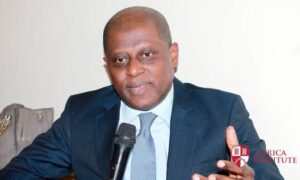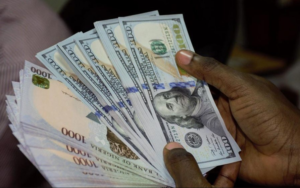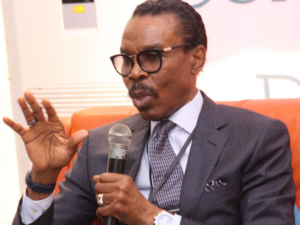…as CBN pulls forex out of commercial banks grip with Retail Dutch Auction System
After over a decade of dangerous racketeering in Nigeria’s foreign exchange market by commercial banks, the Central Bank of Nigeria (CBN) has reintroduced the Retail Dutch Auction System (rDAS).
The CBN said the rDAS was targeted at reducing the current pressure mounted by forex demands in the country, but an understanding of how the forex auction system works exposes a desperate bid by the CBN to pull forex transactions out of the control of the commercials banks.

CBN Governor, Olayemi Cardoso
The commercial banks in Nigeria in the last one decade have had fishy business relationship with bureau de change operators racketeering the country’s foreign exchange market, a system from which the government now seeks windfall taxes from the banks.
Understanding the rDAS
The retail Dutch Auction System of foreign exchange operation is a system in which the CBN directly sell forex to end users through the commercial banks (which is an authorised dealer.)
It is based solely on actual demand of forex by the end users of the forex. As such, the authorised dealers will only bid for forex based on the number of actual requests it has received from its end users. For example, if an authorised dealer has received only $1million of confirmed dollar requests from its end users, it can only bid for that $1million from the CBN auction.

This is a complete vacation of the existing system before now in which the CBN hands down forex to banks to sell to the end users. This system was grossly abused by the banks which were only selling a larger chunk of their forex allocations to bureau de change and starved the genuine end user of forex. The end user had no option than to go to the bureau de change which had set a high price for forex in order to maximise profits.
How rDAS will solve Nigeria’s forex problems — Bismarck Rewane
However, renowned economist and MD/CEO, Financial Derivatives Company Limited, Bismarck Rewane has explained how the rDAS can help to lessen the pressure posed by forex problems on the economy.
He said the system would stabilise the forex market, if the process is implemented with transparency.
Explaining how the rDAS works he said: “Basically, the rDAS means that when someone needs forex, he would apply through his bank to the CBN indicating how much he wishes to buy the forex. If one customer indicates to buy dollar at N1,700 for instance, and another indicates to buy at N1,500, the one who has offered a higher price would be sold to first. This system may have some negative impact in the short run because people will take some time to understand it, but once the system is understood, it will lead to a more stable foreign exchange.”
Rewane who is a member of the President Bola Tinubu’s economic think-tank group, the Presidential Economic Coordination Council (PECC) however called on the CBN to ensure that there is utmost transparency in the rDAS system.

Renowned economist and MD/CEO, Financial Derivatives Company Limited, Bismarck Rewane
“What is required is that the system has to be transparent and once that is done — that there’s no favouritism and it’s objective, you find that the true value of the naira will emerge from that process,” he said on Channels Television Business Morning show today.
He noted the sharp reaction of the naira to the take off of the rDAS on Monday, as the naira fell to N1,602 against the dollar, saying that it could take up to six weeks before the naira stabilises with the rDAS in place.
He said: “For now, yesterday the naira depreciated because people are not fully aware of the modalities of this system. By the way, it is not a new system. We had the retail Dutch Auction System before and we’ve also had the wholesale Dutch Auction System.
“Another factor that we must bear in mind is that every bank has to put naira behind the bidding. So the situation of the bank borrowing money from the CBN in order to buy forex from the CBN does not exist. The bank must fund its account and its customers must have paid in naira for the amount of forex they want to get from the CBN.
“So this system will lead to tighter money supply, that is higher interest rate, but at the same time, it will lead to a more stable exchange rate.
“I will suspect that it will take a minimum of four to six weeks before we can get a stable non-volatile.”


